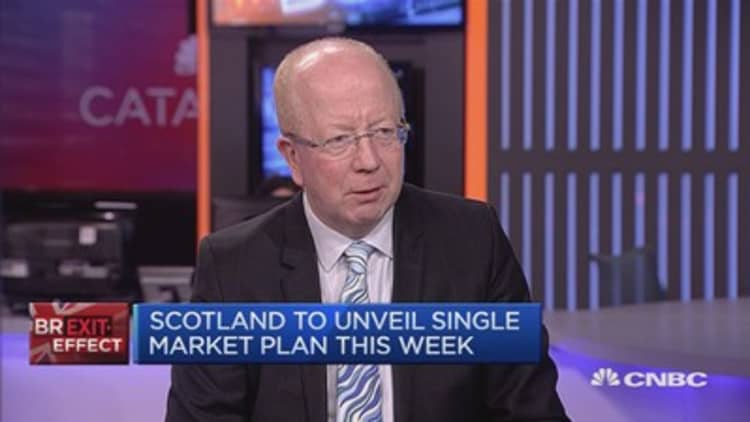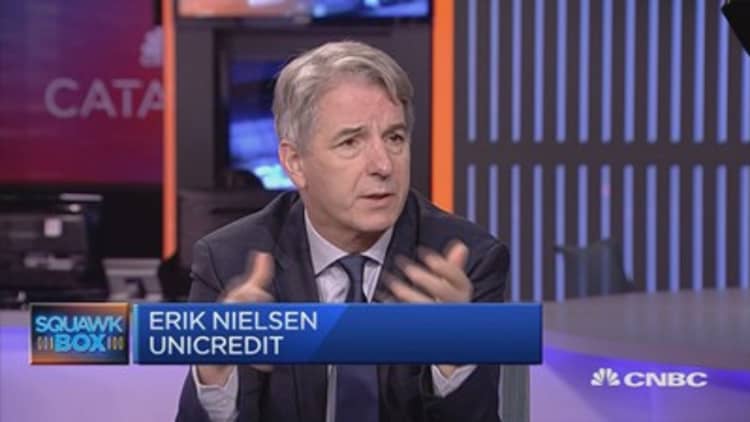
The positive direction of U.S. markets is defensible when you look at the underlying health of the U.S. corporate sector rather than focus on politics, according to the CEO of asset management firm Principal Global Investors.
Jim McCaughan told CNBC Monday that he doesn't see current valuations as a big problem. "We are still high teens PE (price-to-equity) ratio which is 5 percent plus earnings yield, which against any likely 10-year bond yield is still pretty attractive," he calculated, adding his stance was predicated on a very healthy U.S. business sector.
"You're seeing some recovery in housing, you're seeing technology innovation, decent but not great productivity - but the U.S. has the products in many cases the rest of the world wants – whether it's aerospace or technology or entertainment content. All of those things sell well internationally," he continued.
Regarding fixed income, McCaughan said he saw the current 2.6 percent yield on the U.S. 10-year Treasury bond as being consistent with at least three rate increases by the Federal Reserve next year.
From this point, he said he did not expect the yield to rise much more, however, he suggested he would favor certain types of "thoughtful" credit risk over duration risk (exposure to interest rate changes).
"I continue to believe there is good value to be had in high yield bonds and real estate debt … Whereas duration risk is not something I would be counselling people to be aggressive on," he recommended.
Turning to politics, the chief of the fund manager with $417 billion assets under management conceded the risks were non-negligible, particularly with regards to the recent flare-up in rhetoric between the U.S.and China, largely through media and social media platforms.
"It's still just noise but it could turn into something worse ... There's been a rather unpleasant war of words around this drone incident. If that turns into a real risk of policy change, impediments to trade, tariffs. If that were to happen that would cause real economic damage," he cautioned.
"So long as it's just noise, I think the market can probably live with it. And the setbacks it creates probably remain, slightly nervously, buying opportunities," McCaughan argued.
‘A dangerous cocktail’

Taking a less benign view of matters, Erik Nielsen, global chief economist for Unicredit, told CNBC Monday that he was worried on several fronts about the incoming administration and how the equity markets were embracing the January change-of-guard.
"There is a tendency now when the market has started to rally that people have picked from the big arsenal of statements and tweets that Trump puts out to believe the ones you would like to believe and dismiss the others," he observed.
As examples, Nielsen said investors seemed to believe that Trump would deliver a big, workable fiscal package and that his less growth-friendly suggestions, such as trade restrictions and throwing out illegal immigrants, would be jettisoned.
He accused investors of blindly only believing what suited them and cautioned, "That's always a dangerous cocktail."
McCaughan was in agreement about investors' assessment,saying "the market is assuming that the new administration will be more pragmatic than some of the campaign talk."
He also acknowledged the risks to this stance.
"That may be a dangerous assumption but for the moment it appears to be the likely outcome. We have to watch for anything that changes that."
As an additional concern, Unicredit's Nielsen said given where the U.S. was in terms of the economic cycle, it was not a normal time to pursue fiscal stimulus.
"Is it actually going to fuel the economy to the extent that people think? I have my doubts this late in the cycle," he asserted.
While praising the president-elect for the business experience and achievements of his economic picks, Nielsen also sought to draw the distinction between business and economics.
"As an economist you would have liked to have seen someone with economy policy making background … Running a business is not exactly the same as running public policy."
According to Nielsen, it is difficult to guess what the team will do given they do not have a track record of creating or writing about economic policy.
"Uncertainty is a very big part of my concern here."


